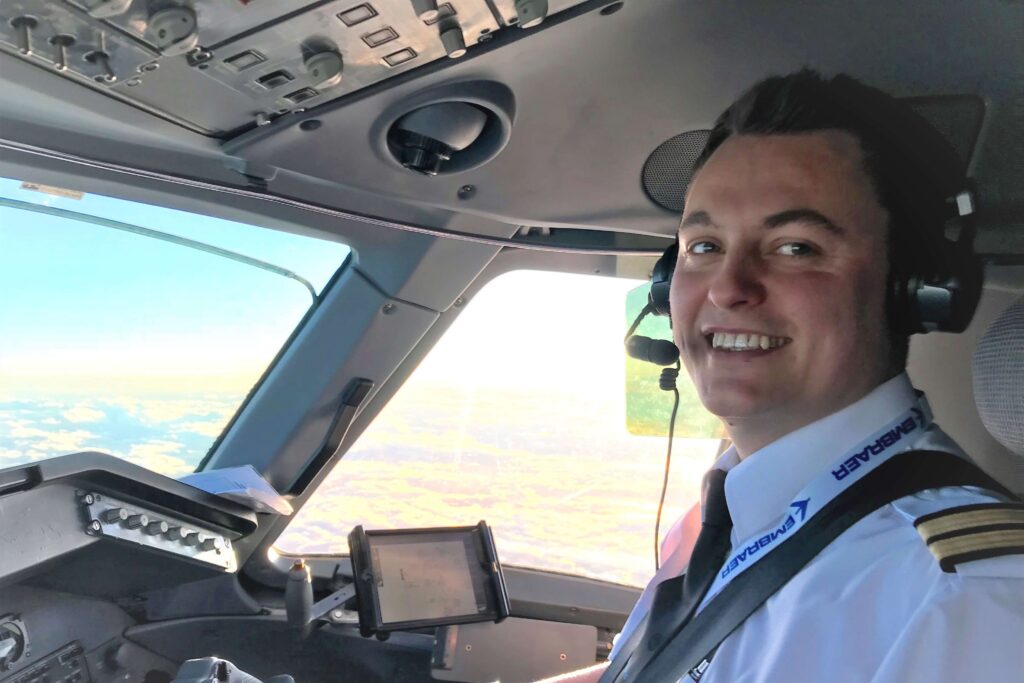In March 2020, Paul Green lost his dream job as a commercial airline pilot when his employer, the former British air carrier Flybe, ceased all operations during the COVID-19 pandemic. However, Paul, 35, applied his specific set of professional skills, knowledge, and a decade of aviation experience to a new business venture.
As airlines across the world began grounding their fleets due to the sharp decline in air travel, Paul, 35, who has a type rating to operate Embraer ERJ145 and Bombardier Dash 8 Q400 turboprop, felt dejected about securing a job at another airline.
“In March 2020, there weren’t any jobs left for Dash 8 pilots anymore as most of the airlines that have been flying the type have stopped using them at that moment,” Paul says.
Rather than remain despondent about the global situation, Paul, whose childhood dream was to be a pilot, considered how he might adjust to the changes in the industry. As a result, Paul has now formed his own coaching business where he utilizes various techniques honed during his time as a pilot. His business aims to help people navigate stressful situations and manage fatigue.
Pilots are trained to make important decisions and are often required to do so instantaneously. So, Paul began to share his skillset with business owners to help them increase profitability by implementing decision-making methods used by pilots.
Paul was also recruited by the National Health Service (NHS) in the UK to deliver training to its frontline staff and help them to navigate the challenges of COVID-19.
He says: “It’s stress and fatigue management in particular. When it comes to anything to do with stress or fatigue outside of aviation, people usually get told to move away from the stressful situation or take some time off. But if you’re at 38,000 feet with an engine fire, you can’t take your yoga mat out and start meditating, you have to deal with the situation.”
Currently, Paul works with thousands of doctors and nurses across the UK.
He adds: “It’s exactly the same [for] these doctors right now who are dealing with a global pandemic. They don’t take time off even if they feel stressed or exhausted. So, they need to have the same coping strategies that pilots use when they’re flying. That’s how The Cockpit Method was born and [it’s] what I’ve been teaching them for the last year now.”
Paul believes that, alongside drills and instructions used in emergency procedures, flight crew knowledge regarding tense and unusual situations can be used to deal with stressful circumstances outside of the aviation industry.
“I help people to realize that they don’t have to bury their heads in the sand or run away from stressful situations. There are lots of techniques that we learn as pilots [and they] could be used in any other industry. For example, NITS Briefing, which is used to guide crew members while in a high-stress situation onboard, works so well with NHS staff [such as] doctors who are dealing with the crisis every day.”
When AeroTime asked Paul about his life pre-pandemic, he disclosed that while he does miss his piloting career, it wasn’t always easy to combine his profession with his personal life. Before the pandemic struck, Paul was on track to be promoted to Captain but, due to COVID-19, his dream of gaining four golden stripes on his uniform was unceremoniously paused.
Although currently focusing on his new business, Paul upholds a desire to return to the aviation industry as soon as an opportunity arises. While Paul feels passionate about helping people and has observed many promising prospects for his business, he would like to continue to maintain his coaching role and still further his pilot career.
He says: “I definitely want to return to flying in some capacity. I might become a flight instructor. I’m kind of open to anything, really. My business is doing so well, I don’t want to stop doing that. But at the same time, I love flying [and] since aviation is my passion, I want to get back to it whenever I can. But I can’t run my business without flying actively – my business kind of loses its value. The ideal for me would be to have both going side by side.”
Paul also believes that the pandemic has highlighted a need for the aviation industry to be more robust.
“The pandemic makes people realize that we need to build more resilience in the industry, that it is a bit of a boom and bust. Things can go from being amazing then, all of a sudden, they can crash and be terrible as we’ve seen in previous years. I think just a tiny bit more resilience might have helped some of the other airlines to weather the storm a little bit.”
